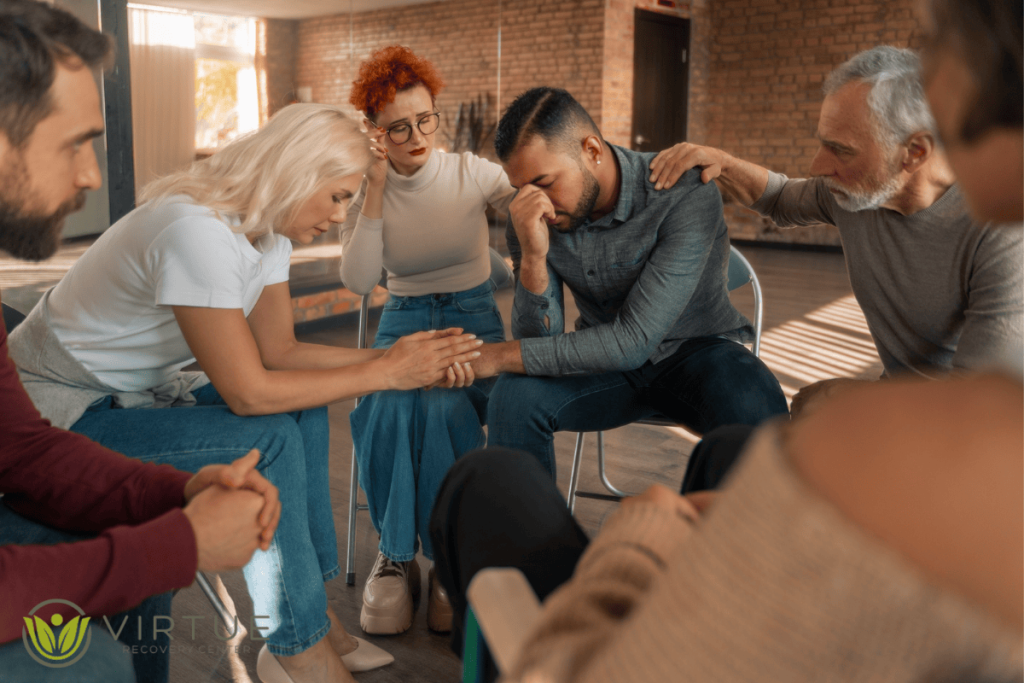Key Takeaways
- Drug addiction, especially to opioids, changes the brain’s circuits for stress and reward in a significant manner.
- Substance use disorder is a medical disease, not a sign of moral weakness.
- The COWS Score is a significant clinical measure for determining how bad opioid withdrawal is.
- To get well, you need a mix of behavioral assistance, medical detox, and treatment for opioid addiction.
- Structured programs and practices for preventing relapse may help people stay sober for a long time.
Introduction
Opioid usage has become one of the most critical public health problems in the United States. What starts as a prescription for pain treatment may turn into dependency and, ultimately, a cycle of abuse that destroys lives. Drug addiction is at the center of this dilemma. It is a disorder that is affected by both behavior and significant changes in brain chemistry.
It’s not as easy as just deciding to stop using opioids; it’s a fight against the brain’s rewiring that causes cravings and withdrawal. This is why substance use disorder is a long-term illness that needs expert help to get well. By learning about the neuroscience of opioid addiction and utilizing tools like the COWS Score to keep track of withdrawal, both doctors and patients may better find their way to recovery.
What Causes Opioid Drug Addiction?
Opioids attach to receptors in the brain, spinal cord, and other organs to ease pain and make people feel good. The brain changes throughout time, which makes it less able to handle pain and generate hormones that make you feel good. This change makes you tolerant, which means you require bigger dosages to have the same impact.
In the end, opioids are necessary for the brain to work correctly. When someone attempts to quit using, they start to feel withdrawal symptoms, which makes them want to use more. This is why it is so hard to overcome opioid addiction without help from a structured rehabilitation program.

How Does Substance Use Disorder Change The Brain?
Substance use disorder is more than just using drugs without thinking; it shows that the brain’s chemistry has changed a lot. Extensive research, including Kosten & George’s neurobiological study, shows that opioid misuse impacts three major brain systems:
- Reward pathway: Opioids make the brain release too much dopamine, which changes the way it works so that drug usage is more critical than regular rewards like relationships or accomplishments.
- Stress pathway: When people aren’t using, they often feel more stressed, irritable, or anxious, which can lead them to want to use again.
- Self-control pathway: Using drugs for a long time hurts the prefrontal cortex, which makes it harder to manage impulses and make decisions.
This is why people who use opioids may go back to using them even after being sober for a while: the brain’s wiring has changed.
What Is the COWS Score, and Why Is It Important?
The Clinical Opiate Withdrawal Scale (COWS Score) is a typical way for doctors to figure out how bad a person’s opioid withdrawal is. It looks at symptoms like:
- Pulse rate at rest
- Sweating
- Not being able to sit still
- Size of the pupil
- Upset stomach
- Nervousness or anger
- Tremors and skin that looks like gooseflesh
Scores vary from moderate to severe withdrawal, which helps doctors decide whether to start medication-assisted treatment (MAT). For instance, beginning therapy too soon may make withdrawal symptoms worse, while starting too late may make the pain last longer.
Using the COWS Score makes the detox procedure safer and more pleasant for patients.
Why Is It So Dangerous To Stop Taking Opioids On Your Own?
Many individuals attempt to stop “cold turkey,” thinking that only willpower will be enough. But coming off opioids may be very hard and even deadly in certain situations. Some of the symptoms include vomiting, diarrhea, dehydration, not being able to sleep, extreme anxiety, and strong desires.
Without medical supervision, these withdrawal symptoms frequently prompt people to go back to using drugs, and since tolerance diminishes after even a brief time, relapse may lead to overdose. This means that professional drug rehabilitation therapy is not only helpful but also necessary for survival.
How Can Treatment Programs Help Those Who Are Addicted To Opioids?
Rehabilitation programs address opioid addiction by giving them medical, behavioral, and emotional assistance. The best ways to do this are:
- Medical detoxification — supervised withdrawal using drugs like buprenorphine or methadone to make the symptoms less severe.
- Medication-Assisted Treatment (MAT) — Long-term usage of FDA-approved drugs together with counseling to lower the risk of relapse and cravings.
- Behavioral therapies — Evidence-based treatments, such as Cognitive Behavioral Therapy (CBT), that help people change the way they think and how they deal with problems.
- Peer and family support — including group therapy and family counseling — to strengthen support networks and hold individuals accountable.
Rehab institutions take a whole-person approach to rehabilitation by treating both the physical and mental elements of drug use disorder.
What Part Do Mental Health Problems Play In Opioid Addiction?
People who are addicted to opioids typically also have mental health problems, including depression, anxiety, or PTSD. This dual diagnosis makes rehabilitation harder since untreated mental issues might lead to relapse.
Integrated therapy methods treat both problems at the same time. For instance, therapy may help people understand how trauma affects their drug use, and pharmaceuticals can help people feel better and stop wanting drugs. Recovery isn’t complete unless all sides of the disease are treated.
Can The Brain Become Better After Using Opioids For A Long Time?
The good news is that the brain may start to mend if you keep recovering. Studies by the National Institute on Drug Abuse (NIDA) show that dopamine pathways and cognitive function improve. But rehabilitation takes time and work.
Neuroplasticity, the brain’s ability to change, suggests that people can learn to think and act in healthy ways through regular therapy. Therapies that assist, lifestyle modifications, and strategies to prevent relapse all help make these new connections stronger.
Why Is It Important To Stop Relapsing When Recovering From Opioids?
People who are addicted to opioids often go back to using them, much like people with diabetes or high blood pressure. This doesn’t indicate that therapy didn’t work; it only implies that continued care is needed. Some ways to keep against relapsing are:
- Recognizing early warning indicators like stress, loneliness, or cravings.
- Going to therapy or support groups regularly.
- Using MAT to keep brain chemistry stable.
- Making healthy habits around sleep, food, and exercise.
People have a better chance of staying sober if they think of addiction as a long-term illness instead of a short-term issue.

Conclusion
Addiction to opioids isn’t simply a matter of willpower; it’s also about significant changes in brain chemistry that make it very hard to stop. Substance use disorder changes the processes that control rewards, stress, and decision-making, which leads to a cycle of dependency. The COWS Score and other tools make sure that withdrawal is safe, and complete treatment programs deal with both the physical and mental parts of recovery.
Recovery is possible, even if the route is challenging. People may get their health back and start again with medical detox, behavioral therapy, and continuing relapse prevention. Virtue Recovery Las Vegas is here to assist if you or someone you care about is addicted to opioids. To start your road to freedom and recovery, call us immediately at 866-520-2861.
FAQs
How is opioid addiction different from other drug addictions?
Opioids are very hard to stop using on your own since they make you physically dependent and cause very severe withdrawal symptoms.
What is the COWS Score utilized for in therapy?
The COWS Score tells doctors how bad the withdrawal is and when and how to start medication-assisted treatment.
Is it possible for the brain to repair after years of abusing opioids?
Yes, brain function may become a lot better with regular therapy and being sober, but it takes time to heal completely.
Why do many go back to drugs after detox?
Detox gets rid of the substance, but it doesn’t get rid of the cravings or mental triggers. The danger stays high without methods to stop relapses.
Is it safe to take medication-assisted therapy for a long time?
Yes. When used alongside therapy, MAT is thought to be one of the safest and most effective long-term therapies for opioid addiction.
Resources:
- Kosten, Thomas R., and Tony P. George. “The Neurobiology of Opioid Dependence: Implications for Treatment.” Journal of Addictive Diseases, vol. 21, no. 2, 2002, pp. 13–30. PMC, 19 Apr. 2001, https://pmc.ncbi.nlm.nih.gov/articles/PMC2851054/.
- Lake County Health Department. “Opioid Withdrawal: Understanding the Challenges and Symptoms of Recovery.” Lake County, Indiana Government, 8 Sept. 2024, https://lakecountyin.gov/departments/health/Nursing-Clinic/Prevention/Opioids/opioid-withdrawal-understanding-the-challenges-and-symptoms-of-recovery. ‘
- National Institute on Drug Abuse. “Drugs, Brains, and Behavior: The Science of Addiction.” NIDA, 7 Jan. 2025, https://nida.nih.gov/publications/drugs-brains-behavior-science-addiction/drugs-brain.









